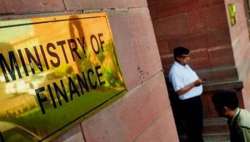The Centre has made the use of Public Finance Management System (PFMS) mandatory for all central schemes. Finance Minister Arun Jaitley said on Thursday that making use of the PFMS mandatorily will go a long way in ensuring that benefits of government schemes reach the last mile.
Launching the mandatory use of the tracking and monitoring system, FM Jaitley expressed hope that that PFMS would progress towards a Government-wide Integrated Financial Management System (GIFMIS) - as a comprehensive payment, receipt and accounting system.
The move would help in tracking and monitoring the flow of funds to the implementing agencies, Jaitley said, adding that it would help the government ascertain the actual status of utilization of funds by the multiple implementing agencies of the central and the state governments.
“The ultimate purpose of implementing any scheme is to ensure that the benefits must reach to the last mile,” Jaitley said, making specific mention of the implementation of various schemes through Direct Benefit Transfer (DBT) mechanism.
The central schemes that are now mandated to use the PFMS have a budgetary outlay of Rs.6, 66,644 crore and cover over 31 per cent of the central government’s total expenditure during the current financial year 2017-18.
“PFMS, with the capability of providing real time information on resource availability, flows and actual utilization has tremendous potential to improve programme or financial management and reduce the float in the financial systems by enabling ‘just in time’ releases,” Jaitley said while addressing senior officials of the Finance ministry and others.
The move will also cut the need for paper work and would go a long way in monitoring and tracking of any unnecessary parking of funds by the implementing agencies, thus minimising cases of delay and pending payments to a large extent.
Through PFMS, the government expects not just complete tracking of funds but also ensuring timely transfer of funds.
Finance Secretary Ashok Lavasa said that over 300 central and state government schemes are now riding on PFMS. “Payment of more than Rs. 2.91 lakh crore relating to various Schemes under DBT has been made through PFMS since 2013,” he said.
The Finance Secretary further said that PFMS was poised to develop as one of the biggest financial management systems of the world, critical for bringing about transformational accountability and transparency in promoting overall good governance.
“As on date, payments to 34.19 crore beneficiaries have been made through PFMS and there are 21.72 lakh programme implementing agencies registered on PFMS. This has been achieved on the strength of PFMS having an interface with 170 banks including the Reserve Bank of India (RBI),” he said.
To ensure that states take to this platform with ease, the Centre decided in favour of a phased and calibrated roll-out for smooth implementation. The ministry said that this was done keeping in mind the enormous amounts of preparation and training that will have to be undertaken.
A total of 613 schemes of the central government will be covered under PFMS. The preparatory work at the ministries which control these schemes has already been completed, the FM said.
The ambit of PFMS coverage includes central sector and centrally sponsored schemes as well as other expenditures including the Finance Commission grants.
Funds under the centrally sponsored schemes flow almost entirely to the state government treasuries and a substantial part of the funds under the central schemes are also spent in the states through various central agencies, the Finance ministry said in a statement.
The improvements brought-out in the Management of Public Funds through PFMS will have a cascading beneficial impact on the management of state government public finances as well as efficient delivery of public services by the states, it added.
Latest Business News

